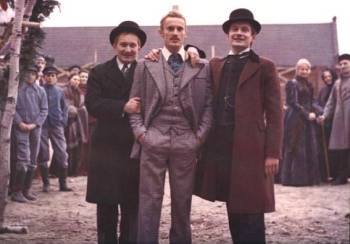 | ||||||||||
Ziemia obiecana [Promised Land]
 fot: Renata Pajchel |
In spring 1973, tired and dissatisfied with myself, I occupied myself with work around the house. Krystyna had just sown the lawn and the experts advised us that the first trimming had to be done with scissors. Kneeling, I managed to cut a surface not much bigger than a table, and then decided I preferred to make films after all. I immediately felt light and full of energy.
I suggested Promised Land. The project was accepted and next summer we began to shoot. We became involved in a wonderful adventure with a city, where every day revealed to us new fragments of its unique past.
However, the greatest source of riches for the film was Reymont's novel itself. I was quite aware of this.
Reymont described people who after Romanticism initiated a new development in our history. Without them, without their factories, without the workers who had worked there in terrible conditions, today would not have been.
One of the three leading characters is a Pole, the secong - a German, and the third - a Jew. These ethnic differences do not come between them. They found a factory together, and are linked by a shared business and by a sense of belonging to the group of "Lodzermensch" - the men of Lodz. This peculiar Polish-German-Jewish amalgam of Lodz population at that time is extremely interesting; it seduces with colour, variety of customs and of human types and attitudes.
Promised Land is the only Polish novel of this type, absolutely unique in Polish literature. Its realism was perfectly compatible with the essence of cinema, which relies on photographic description of the world. Also the dialogues proved to be nearly phonetic records of the language used by people observed by Reymont. Each of the characters speak his own language, expressing in Polish thoughts translated from German, Russian, or Yiddish, and thus creating a linguistic richness not present in any other Polish novel written at the end of the 19th century.
Andrzej Wajda
Reviews
Andrzej Wajda not only discarded Reymont's emotional descriptions, he also parted with some of his illusions, such as that decent and persevering people "could survive in Lodz." In the film version of Promised Land, Trawinski, who in vain asked his compatriot Borowiecki for assistance, commits suicide... The vast majority of characters in Promised Land are creatures who openly admit that in their activity they are not guided by ethics, who do openly do things that members of the more enlightened Western middle class tend to veil in patriotic slogans, justify by "higher goals", or compensate by ostensible "charity."
Thus, Promised Land shows us uncivilised capitalism, raw and realistic like some emanation of the animal nature of human beings.
Konrad Eberhardt
"Kino", Warsaw, December, 1974
It might seem that Wajda is fascinated by the robust vitality, energy and enterprise of three young heroes of Promised Land, and by their lack of inhibitions and sexual appetites. (...) In fact, he shows - in a much more penetrating way than Reymont - the emptiness of their lives disguised in dynamic infantilism and deadened by the automatic response of making "big money" at all costs.
Tomasz Burek
"Kino", Warsaw, December, 1974
The film Promised Land was received in Poland with many reservations. The main accusation against the director was that he equipped Borowiecki, a Pole, with the most disgusting features of the three. Such an interpretation was not faithful to the original, since Reymont's novel was at times very anti-Semitic. (...)
In Wajda's film, Borowiecki remains the most vicious and destructive character until the very end. According to Wajda his inhuman attitude was due to circumstances: Borowiecki, being the least wealthy, had to be particularly ruthless in order to achieve success. The value of this film lies in the ruthless assessment of Polish history, as it disproves the convenient thesis that the "bad guys" were always the Jews or the Germans.
Michael Schwarze
"Frankfurter Allgemeine Zeitung", Frankfurt, 12 January, 1976
Wajda presents a shocking image of the city, with its dirty and dangerous factories and ostentatiously opulent residences devoid of taste and culture, like Mⁿller's house. We are reminded of the descriptions by Dickens, Zola, Gorki, as well as of naturalist paintings of that period (Corot, early Van Gogh, Edvard Munch) and the later German expressionists, Knopf, Meidner, Grosz who gave testimony tosocial protest.
Max Tessier
"Écran", Paris, March, 1976
This film is available at the Merlin bookstore
Stanislaw Reymont's Ziemia obiecana is available at the Merlin bookstore
Oscar | Films | Theatre | Why Japan?
Favourites | Pictures gallery | About Wajda | Bibliography
Main Page | Search | Wersja polska
Copyright © 2000 Proszynski i S-ka SA. All rights reserved